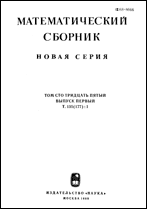|
This article is cited in 10 scientific papers (total in 10 papers)
An independence theorem and its consequences
V. A. Ufnarovskii
Abstract:
The following theorem is proved: Let $A_1,\dots,A_d$ be linear operators in a vector space $V$, $v\in V$, and let the word $C=A_{k_1}A_{k_2}\dots A_{k_n}$ be maximal in the right lexicographical order among all words of length $n$ satisfying the condition $Cv\ne0$. If all the operators corresponding to the subwords of $C$ are nilpotent, then the vectors $v$, $A_{k_n}v$, $A_{k_{n-1}}A_{k_n}v,\dots,A_{k_1}A_{k_2}\cdots A_{k_n}v$ are independent.
As a corollary, a proof is presented of Shestakov's conjecture about the number of nil-conditions necessary for a subalgebra of a matrix algebra to be nilpotent.
Bibliography: 5 titles.
Received: 27.06.1984
Citation:
V. A. Ufnarovskii, “An independence theorem and its consequences”, Mat. Sb. (N.S.), 128(170):1(9) (1985), 124–132; Math. USSR-Sb., 56:1 (1987), 121–129
Linking options:
https://www.mathnet.ru/eng/sm2021https://doi.org/10.1070/SM1987v056n01ABEH003027 https://www.mathnet.ru/eng/sm/v170/i1/p124
|


| Statistics & downloads: |
| Abstract page: | 368 | | Russian version PDF: | 126 | | English version PDF: | 10 | | References: | 40 |
|




 Contact us:
Contact us: Terms of Use
Terms of Use
 Registration to the website
Registration to the website Logotypes
Logotypes








 Citation in format
Citation in format 
